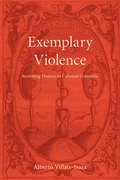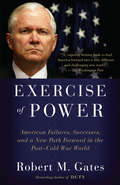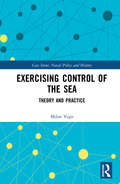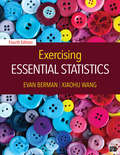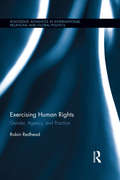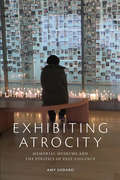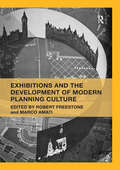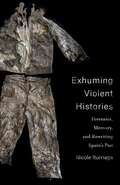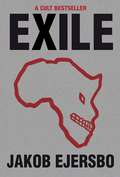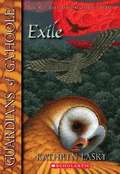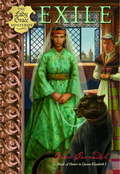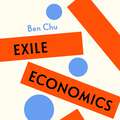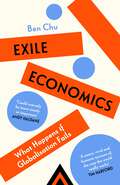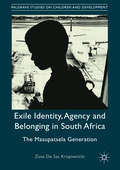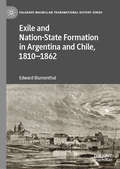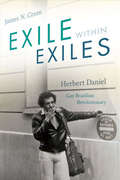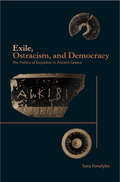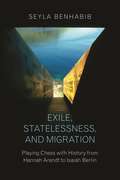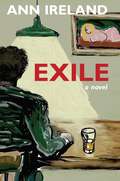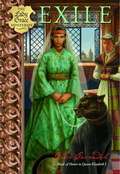- Table View
- List View
Exemplary Violence: Rewriting History in Colonial Colombia (Bucknell Studies in Latin American Literature and Theory)
by Alberto Villate-IsazaIn his seminal essay Discourse on Colonialism, Aimé Césaire asserts that colonization ultimately works to decivilize the colonizer, awakening baser, brutalizing, and dehumanizing instincts. In this crucial new study, Villate-Isaza explores the violent colonial history of the New Kingdom of Granada (modern-day Colombia and Venezuela) by examining three seventeenth-century historical accounts—Pedro Simón’s Noticias historiales, Juan Rodríguez Freile’s El carnero, and Lucas Fernández de Piedrahita’s Historia general—each of which reveals the colonizer’s reliance on the threat of violence to sustain order. Despite their attempts to convey a narrative of European political, technical, and moral superiority, these accounts reveal tensions between the writers’ social interests and personal identifications. As they attempt to reinforce the principal tenets of European civilization and Catholic Reformation orthodoxy, they also reveal contradictions that emerge when colonizers behave in barbaric ways.
Exercise of Power: American Failures, Successes, and a New Path Forward in the Post-Cold War World
by Robert M. GatesFrom the former secretary of defense and author of the acclaimed #1 best-selling memoir, Duty, a candid, sweeping examination of power in all its manifestations, and how it has been exercised, for good and bad, by American presidents in the post-Cold War world.Since the end of the Cold War, the global perception of the United States has progressively morphed from dominant international leader to disorganized entity, seemingly unwilling to accept the mantle of leadership or unable to govern itself effectively. Robert Gates argues that this transformation is the result of the failure of political leaders to understand the complexity of American power, its expansiveness, and its limitations. He makes clear that the successful exercise of power is not limited to the use of military might or the ability to coerce or demand submission, but must encompass as well diplomacy, economics, strategic communications, development assistance, intelligence, technology, ideology, and cyber. By analyzing specific challenges faced by the American government in the post-Cold War period--Iran, Iraq, Afghanistan, North Korea, Syria, Libya, Russia, China, and others--Gates deconstructs the ways in which leaders have used the instruments of power available to them. With forthright judgments of the performance of past presidents and their senior-most advisers, firsthand knowledge, and insider stories, Gates argues that U.S. national security in the future will require learning, and abiding by, the lessons of the past, and re-creating those capabilities that the misuse of power has cost the nation.
Exercising Control of the Sea: Theory and Practice (Cass Series: Naval Policy and History)
by Milan VegoThis book explains both the strategic and the operational aspects of exercising control of the sea. The struggle for sea control consists of three mutually related and overlapping phases: obtaining, maintaining and exercising sea control. It is in the phase of exercising sea control when one’s strategic or operational success is exploited; otherwise, the fruits of victories achieved would be wasted. This work describes the strategy of a stronger side in wartime after a desired degree of control has been obtained, which is followed by a discussion on the objectives and main methods used in exercising sea control. The remaining chapters explain and analyze in some detail each of the main methods of exercising sea control: defence and protection of one’s own and destruction/neutralization of the enemy’s military-economic potential at sea, capturing the enemy’s operationally important positions ashore, destroying/weakening the enemy’s military-economic potential ashore and supporting one’s ground forces in their offensive and defensive operations on the coast. This book will be of much interest to students of strategic studies, sea power and naval history.
Exercising Essential Statistics
by Evan M. Berman XiaoHu WangThrough the use of critical thinking questions and data-based exercises Exercising Essential Statistics helps students apply the techniques described in Essential Statistics for Public Managers and Policy Analysts, Fourth Edition. This accompanying workbook gives students the opportunity to practice these techniques through hands-on, carefully crafted exercises. Various examples are provided from human resource management, organizational behavior, budgeting, and public policy to illustrate how public administrators interact with and analyze data.
Exercising Essential Statistics
by Evan M. Berman XiaoHu WangThrough the use of critical thinking questions and data-based exercises Exercising Essential Statistics helps students apply the techniques described in Essential Statistics for Public Managers and Policy Analysts, Fourth Edition. This accompanying workbook gives students the opportunity to practice these techniques through hands-on, carefully crafted exercises. Various examples are provided from human resource management, organizational behavior, budgeting, and public policy to illustrate how public administrators interact with and analyze data.
Exercising Human Rights: Gender, Agency and Practice (Routledge Advances in International Relations and Global Politics)
by Robin RedheadExercising Human Rights investigates why human rights are not universally empowering and why this damages people attempting to exercise rights. It takes a new approach in looking at humans as the subject of human rights rather than the object and exposes the gendered and ethnocentric aspects of violence and human subjectivity in the context of human rights. Using an innovative visual methodology, Redhead shines a new critical light on human rights campaigns in practice. She examines two cases in-depth. First, she shows how Amnesty International depicts women negatively in their 2004 ‘Stop Violence against Women Campaign’, revealing the political implications of how images deny women their agency because violence is gendered. She also analyses the Oka conflict between indigenous people and the Canadian state. She explains how the Canadian state defined the Mohawk people in such a way as to deny their human subjectivity. By looking at how the Mohawk used visual media to communicate their plight beyond state boundaries, she delves into the disjuncture between state sovereignty and human rights. This book is useful for anyone with an interest in human rights campaigns and in the study of political images.
Exhibiting Atrocity: Memorial Museums and the Politics of Past Violence
by Amy SodaroToday, nearly any group or nation with violence in its past has constructed or is planning a memorial museum as a mechanism for confronting past trauma, often together with truth commissions, trials, and/or other symbolic or material reparations. Exhibiting Atrocity documents the emergence of the memorial museum as a new cultural form of commemoration, and analyzes its use in efforts to come to terms with past political violence and to promote democracy and human rights. Through a global comparative approach, Amy Sodaro uses in-depth case studies of five exemplary memorial museums that commemorate a range of violent pasts and allow for a chronological and global examination of the trend: the U.S. Holocaust Memorial Museum in Washington, DC; the House of Terror in Budapest, Hungary; the Kigali Genocide Memorial Centre in Rwanda; the Museum of Memory and Human Rights in Santiago, Chile; and the National September 11 Memorial Museum in New York. Together, these case studies illustrate the historical emergence and global spread of the memorial museum and show how this new cultural form of commemoration is intended to be used in contemporary societies around the world.
Exhibitions and the Development of Modern Planning Culture
by Robert Freestone Marco AmatiThe evolution of city planning theory and practice in the first half of the twentieth century was captured and driven by a range of exhibitionary practices in a variety of settings globally, from international expos to local public halls. The agendas of the promoters varied, but exhibitions generally drew their social legitimacy from their status as ’appropriate educative agencies of citizenship’. Bringing together a range of international case studies, this volume explores the highly visual genre of public planning exhibitions worldwide. In doing so, it provides a unique lens on the development of modern urban planning and design from the late 19th century to the present day. Focussing mainly on the first half of the 20th century, it looks in particular at historic exhibitions which sought to transform urban society’s understanding of the possibilities of planning as a force for social betterment. The visuality of presentation, contemporary reactions, and outcomes for the planning profession and the community are explored to make for a unique, innovative and attractive approach to the history of planning ideas. The five major themes are the visual representation of ideas and ideologies; institutions and individuals involved; the broader context of display; and the impacts and implications for the development planning culture. With contributors including Karl Fischer, John Gold, Carola Hein, Peter Larkham, Javier Monclus, and Mark Tewdwr-Jones, the dominant intellectual paradigm further unifying the collection is planning history.
Exhuming Violent Histories: Forensics, Memory, and Rewriting Spain’s Past
by Nicole IturriagaMany years after the fall of Franco’s regime, Spanish human rights activists have turned to new methods to keep the memory of state terror alive. By excavating mass graves, exhuming remains, and employing forensic analysis and DNA testing, they seek to provide direct evidence of repression and break through the silence about the dictatorship’s atrocities that persisted well into Spain’s transition to democracy.Nicole Iturriaga offers an ethnographic examination of how Spanish human rights activists use forensic methods to challenge dominant histories, reshape collective memory, and create new forms of transitional justice. She argues that by grounding their claims in science, activists can present themselves as credible and impartial, helping them intervene in fraught public disputes about the remembrance of the past. The perceived legitimacy and authenticity of scientific techniques allows their users to contest the state’s historical claims and offer new narratives of violence in pursuit of long-delayed justice.Iturriaga draws on interviews with technicians and forensics experts and provides a detailed case study of Spain’s best-known forensic human rights organization, the Association for the Recovery of Historical Memory. She also considers how the tools and tactics used in Spain can be adopted by human rights and civil society groups pursuing transitional justice in other parts of the world. An ethnographically rich account, Exhuming Violent Histories sheds new light on how science and technology intersect with human rights and collective memory.
Exile
by Jakob EjersboFor the vagabond pack of ex-pat Europeans, Indian Tanzanians and wealthy Africans at Moshi's International School, it's all about getting high, getting drunk and getting laid. Their parents - drug dealers, mercenaries and farmers gone to seed - are too dead inside to give a damn. Outwardly free but empty at heart, privileged but out of place, these kids are lost, trapped in a land without hope. They can try to get out, but something will always drag them back - where can you go when you believe in nothing and belong to nowhere? Exile is the first of three powerful novels about growing up as an ex-pat in Tanzania. Ejersbo's first novel, Nordkraft, the Danish Trainspotting, was a phenomenal bestseller. Ejersbo's trilogy, only published after his death in 2008, has proved to be another cult and critical sensation.
Exile (Guardians of Ga'hoole #14)
by Kathryn LaskyIn Exile, the book #14 of Guardians of Ga'Hoole Series, The Striga, former dragon owl from the Middle Kingdom beyond the Unnamed Sea, has come to stay at the great tree. He has earned the trust of all by saving Bell, Soren's owlet, from Nyra, and he grows daily closer to the young king Coryn, with whom he seems to share a strange bond.
Exile (Lady Grace Mysteries #5)
by Grace CavendishThere's a new arrival--a mysterious and exotic young princess--at Court and Lady Grace can't believe how many rumours there are about her already. The exiled Banoo Yasmine from Sharakand is a beautiful girl with a pet panther and, everyone believes, magical powers. Yasmine also possesses the renowned Heart of Kings Ruby, a huge stone that she wears around her neck to balls and feasts, that legend says has the power to make kings. When the famed jewel goes missing, the finger is pointed at Grace's dear friend Ellie the laundry maid. Grace must prove her friend's innocence, find the true thief, and restore the stone to its rightful owner.
Exile (The Africa Trilogy)
by Jakob EjersboFor the vagabond pack of ex-pat Europeans, Indian Tanzanians and wealthy Africans at Moshi's International School, it's all about getting high, getting drunk and getting laid. Their parents - drug dealers, mercenaries and farmers gone to seed - are too dead inside to give a damn. Outwardly free but empty at heart, privileged but out of place, these kids are lost, trapped in a land without hope. They can try to get out, but something will always drag them back - where can you go when you believe in nothing and belong to nowhere? Exile is the first of three powerful novels about growing up as an ex-pat in Tanzania. Ejersbo's first novel, Nordkraft, the Danish Trainspotting, was a phenomenal bestseller. Ejersbo's trilogy, only published after his death in 2008, has proved to be another cult and critical sensation.
Exile Economics: What Happens if Globalisation Fails
by Ben ChuTHE MUST-READ GUIDE TO THE TRADE WAR'A smart, vivid and humane account of the way the world really works' TIM HARFORD'This is the book to read if you want to understand what might be about to hit the world economy' EVAN DAVISThe dangerous race for self-sufficiency has begun. Be warned.Nations are turning away from each other. Faith in globalisaton has been fatally undermined by the pandemic, the energy crisis, surging trade frictions and swelling great power rivalry. A new vision is vying to replace what we've known for many decades. This vision - Exile Economics - entails a rejection of interdependence, a downgrading of multilateral collaboration and a striving for greater national self-sufficiency. The supporters of this new order argue it will establish genuine security, prosperity and peace. But is this promise achievable? Or a seductive delusion?Through the stories of globally traded commodities - from silicon to steel and from soybeans to solar panels - economics journalist Ben Chu illustrates the intricate web of interdependence that has come to bind nations together - and underlines the dangers of this new push to isolationism. Exile Economics is an essential guide to this new world in all its promise and peril.
Exile Economics: What Happens if Globalisation Fails
by Ben ChuTHE MUST-READ GUIDE TO THE TRADE WAR'A smart, vivid and humane account of the way the world really works' TIM HARFORD'This is the book to read if you want to understand what might be about to hit the world economy' EVAN DAVISThe dangerous race for self-sufficiency has begun. Be warned.Nations are turning away from each other. Faith in globalisaton has been fatally undermined by the pandemic, the energy crisis, surging trade frictions and swelling great power rivalry. A new vision is vying to replace what we've known for many decades. This vision - Exile Economics - entails a rejection of interdependence, a downgrading of multilateral collaboration and a striving for greater national self-sufficiency. The supporters of this new order argue it will establish genuine security, prosperity and peace. But is this promise achievable? Or a seductive delusion?Through the stories of globally traded commodities - from silicon to steel and from soybeans to solar panels - economics journalist Ben Chu illustrates the intricate web of interdependence that has come to bind nations together - and underlines the dangers of this new push to isolationism. Exile Economics is an essential guide to this new world in all its promise and peril.
Exile Economics: What Happens if Globalisation Fails
by Ben ChuTHE MUST-READ GUIDE TO THE TRADE WAR'A smart, vivid and humane account of the way the world really works' TIM HARFORD'This is the book to read if you want to understand what might be about to hit the world economy' EVAN DAVISThe dangerous race for self-sufficiency has begun. Be warned.Nations are turning away from each other. Faith in globalisaton has been fatally undermined by the pandemic, the energy crisis, surging trade frictions and swelling great power rivalry. A new vision is vying to replace what we've known for many decades. This vision - Exile Economics - entails a rejection of interdependence, a downgrading of multilateral collaboration and a striving for greater national self-sufficiency. The supporters of this new order argue it will establish genuine security, prosperity and peace. But is this promise achievable? Or a seductive delusion?Through the stories of globally traded commodities - from silicon to steel and from soybeans to solar panels - economics journalist Ben Chu illustrates the intricate web of interdependence that has come to bind nations together - and underlines the dangers of this new push to isolationism. Exile Economics is an essential guide to this new world in all its promise and peril.
Exile Identity, Agency and Belonging in South Africa
by Zosa De Sas KropiwnickiThis book examines the experiences of 49 second-generation exiles from South Africa. Using “generation” as an analytical concept, it investigates the relational, temporal and embodied nature of their childhoods in terms of kinship relations, life cycle, cohort development and memory-making. It reveals how child agents exploited the liminal nature of exile to negotiate their sense of identity, home and belonging, while also struggling over their position and power in formal Politics and informal politics of the everyday. It also reflects upon their political consciousness, identity and sense of civic duty on return to post-apartheid South Africa, and how this has led to the emergence of the Masupatsela generational cohort concerned with driving social and political change in South Africa.
Exile and Nation-State Formation in Argentina and Chile, 1810–1862 (Palgrave Macmillan Transnational History Series)
by Edward BlumenthalThis book traces the impact of exile in the formation of independent republics in Chile and the Río de la Plata in the decades after independence. Exile was central to state and nation formation, playing a role in the emergence of territorial borders and Romantic notions of national difference, while creating a transnational political culture that spanned the new independent nations. Analyzing the mobility of a large cohort of largely elite political émigrés from Chile and the Río de la Plata across much of South America before 1862, Edward Blumenthal reinterprets the political thought of well-known figures in a transnational context of exile. As Blumenthal shows, exile was part of a reflexive process in which elites imagined the nation from abroad while gaining experience building the same state and civil society institutions they considered integral to their republican nation-building projects.
Exile within Exiles: Herbert Daniel, Gay Brazilian Revolutionary
by James N. GreenHerbert Daniel was a significant and complex figure in Brazilian leftist revolutionary politics and social activism from the mid-1960s until his death in 1992. As a medical student, he joined a revolutionary guerrilla organization but was forced to conceal his sexual identity from his comrades, a situation Daniel described as internal exile. After a government crackdown, he spent much of the 1970s in Europe, where his political self-education continued. He returned to Brazil in 1981, becoming engaged in electoral politics and social activism to champion gay rights, feminism, and environmental justice, achieving global recognition for fighting discrimination against those with HIV/AIDS. In Exile within Exiles, James N. Green paints a full and dynamic portrait of Daniel's deep commitment to leftist politics, using Daniel's personal and political experiences to investigate the opposition to Brazil's military dictatorship, the left's construction of a revolutionary masculinity, and the challenge that the transition to democracy posed to radical movements. Green positions Daniel as a vital bridge linking former revolutionaries to the new social movements, engendering productive dialogue between divergent perspectives in his writings and activism.
Exile, Murder and Madness in Siberia, 1823–61
by Andrew A. GentesDespite reports of exile proving disastrous to the region, 300,000 Russian subjects, from political dissidents to the elderly and mentally disabled, were deported to Siberia from 1823-61. Their stories of physical and psychological suffering, heroism and personal resurrection, are recounted in this compelling history of tsarist Siberian exile.
Exile, Ostracism, and Democracy: The Politics of Expulsion in Ancient Greece
by Sara ForsdykeThis book explores the cultural and political significance of ostracism in democratic Athens. In contrast to previous interpretations, Sara Forsdyke argues that ostracism was primarily a symbolic institution whose meaning for the Athenians was determined both by past experiences of exile and by its role as a context for the ongoing negotiation of democratic values. The first part of the book demonstrates the strong connection between exile and political power in archaic Greece. In Athens and elsewhere, elites seized power by expelling their rivals. Violent intra-elite conflict of this sort was a highly unstable form of "politics that was only temporarily checked by various attempts at elite self-regulation. A lasting solution to the problem of exile was found only in the late sixth century during a particularly intense series of violent expulsions. At this time, the Athenian people rose up and seized simultaneously control over decisions of exile and political power. The close connection between political power and the power of expulsion explains why ostracism was a central part of the democratic reforms. Forsdyke shows how ostracism functioned both as a symbol of democratic power and as a key term in the ideological justification of democratic rule. Crucial to the author's interpretation is the recognition that ostracism was both a remarkably mild form of exile and one that was infrequently used. By analyzing the representation of exile in Athenian imperial decrees, in the works of Herodotus, Thucydides, Plato, Aristotle, and in tragedy and oratory, Forsdyke shows how exile served as an important term in the debate about the best form of rule.
Exile, Statelessness, and Migration: Playing Chess with History from Hannah Arendt to Isaiah Berlin
by Seyla BenhabibAn examination of the intertwined lives and writings of a group of prominent twentieth-century Jewish thinkers who experienced exile and migrationExile, Statelessness, and Migration explores the intertwined lives, careers, and writings of a group of prominent Jewish intellectuals during the mid-twentieth century—in particular, Theodor Adorno, Hannah Arendt, Walter Benjamin, Isaiah Berlin, Albert Hirschman, and Judith Shklar, as well as Hans Kelsen, Emmanuel Levinas, Gershom Scholem, and Leo Strauss. Informed by their Jewish identity and experiences of being outsiders, these thinkers produced one of the most brilliant and effervescent intellectual movements of modernity.Political philosopher Seyla Benhabib’s starting point is that these thinkers faced migration, statelessness, and exile because of their Jewish origins, even if they did not take positions on specifically Jewish issues personally. The sense of belonging and not belonging, of being “eternally half-other,” led them to confront essential questions: What does it mean for the individual to be an equal citizen and to wish to retain one’s ethnic, cultural, and religious differences, or perhaps even to rid oneself of these differences altogether in modernity? Benhabib isolates four themes in their works: dilemmas of belonging and difference; exile, political voice, and loyalty; legality and legitimacy; and pluralism and the problem of judgment.Surveying the work of influential intellectuals, Exile, Statelessness, and Migration recovers the valuable plurality of their Jewish voices and develops their universal insights in the face of the crises of this new century.
Exile, Writer, Soldier, Spy: Jorge Semprún
by Soledad Fox MauraIn this gripping, authoritative biography, Soledad Fox Maura reveals the tumultuous true-life story of the Oscar-nominated screenwriter responsible for Z and The War Is Over.A man of many faces, Jorge Semprún perfectly personified the struggles and successes of twentieth-century Europe. Semprún enjoyed a privileged childhood as the grandson of Spanish prime minister, Antonio Maura, until his world was shattered by the political strife of the Spanish Civil War and he went into exile. Facing dangers rarely seen outside the action movies of Hollywood, Semprún adopted a resilient spirit and rebel’s stance. He fought with the French Resistance in World War II and survived imprisonment at Buchenwald. After the war, he became an organizing member of the exiled Spanish communist party, maintaining the appearance of a normal civilian life while keeping one step ahead of Francisco Franco's secret police for years. Semprún later put his experiences on paper, becoming an internationally acclaimed author and screenwriter.In this skillfully crafted biography, Semprún's life reads as easily as the best thriller, and has the same addictive rush as watching an edge-of-your-seat mini-series.
Exile: A Novel
by Ann IrelandShort-listed for the 2002 Governor General’s Literary Award for Fiction and the 2002 Roger Writers’ Trust Fiction Prize Rescued from the dangers he faces in a Latin American military dictatorship, writer Carlos Romero Estevez is given a new life in Vancouver. His rescuers, a benevolent group devoted to aiding oppressed writers, believe they’ve found a poster-boy. Carlos thinks he’s found a new life, new freedom, and new, powerful friends. But soon everyone’s illusions are dispelled, and Carlos finds life in exile to be a new kind of prison. Now available in trade paperback format for the first time, Exile is the work of an author in full control of her considerable talents. Award-winning author Ann Ireland is the author of two previous novels: A Certain Mr. Takahashi (1985 - now available from The Dundurn Group), and The Instructor (1996). She teaches at Ryerson University, and is a past-president of PEN Canada.
Exile: The Lady Grace Mysteries, Book 5
by Jan Burchett Sara VoglerThief! When a visiting princess's priceless ruby goes missing, Ellie the laundrymaid is accused of the crime. Will Grace be able to prove her friend's innocence, find the true thief, and restore the stone to its rightful owner? Read the daybooke of Lady Grace, Queen Elizabeth's favorite Maid of Honour, for a mysterious story of jewels and magical powers.
